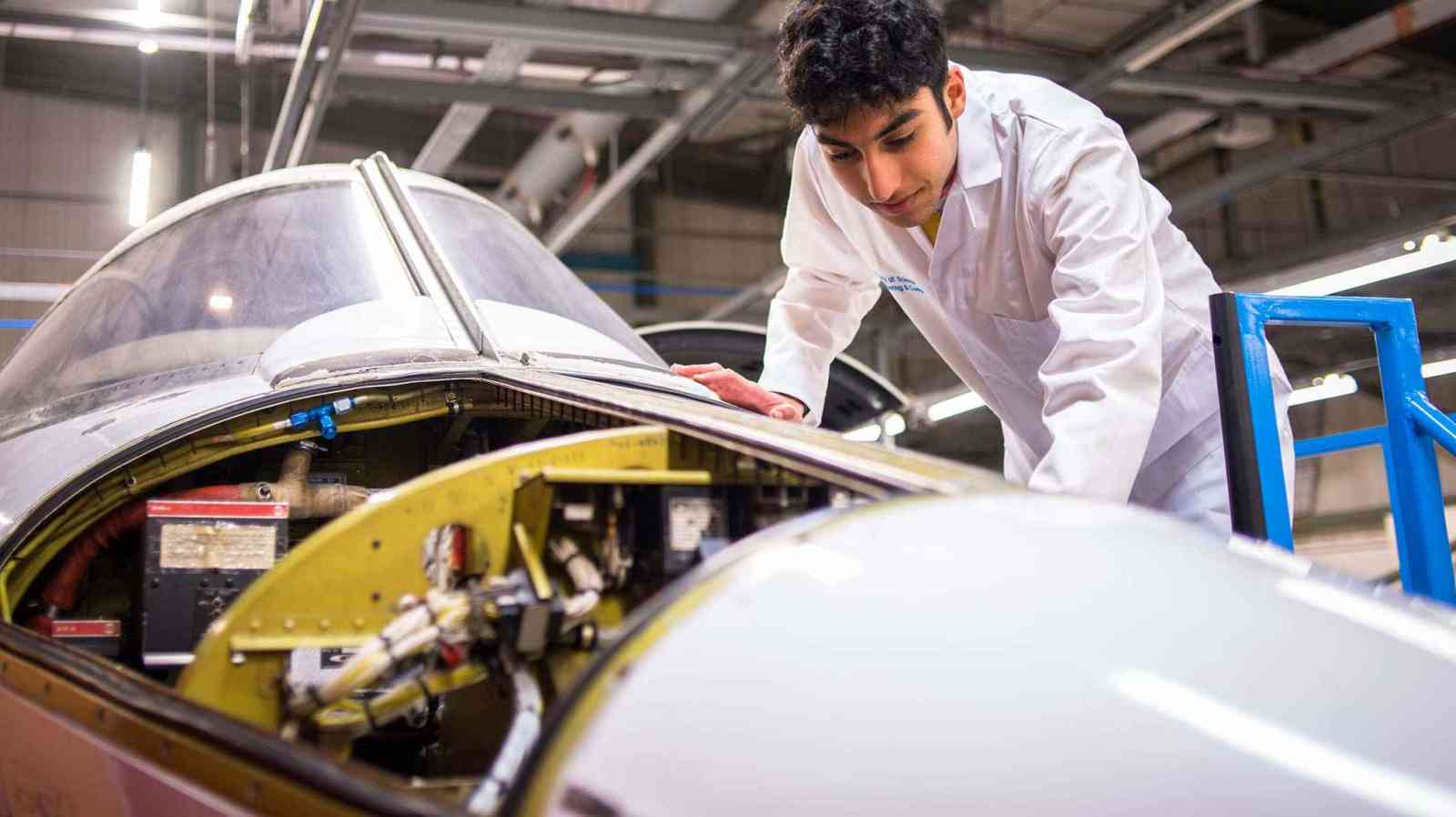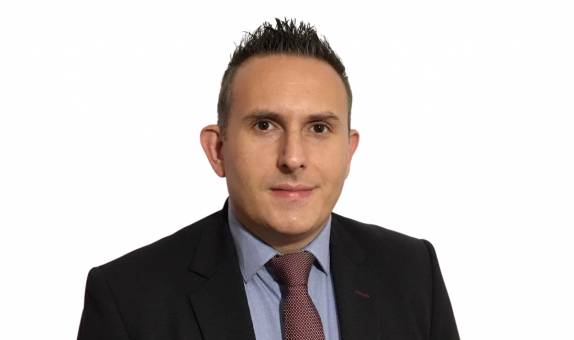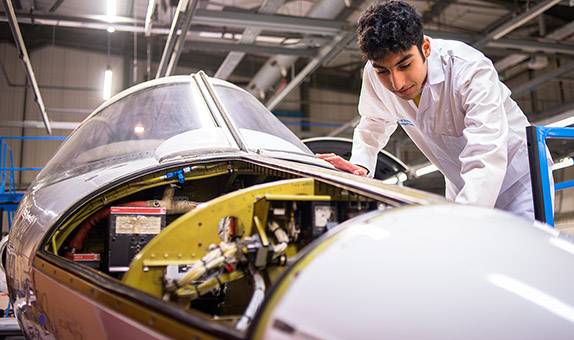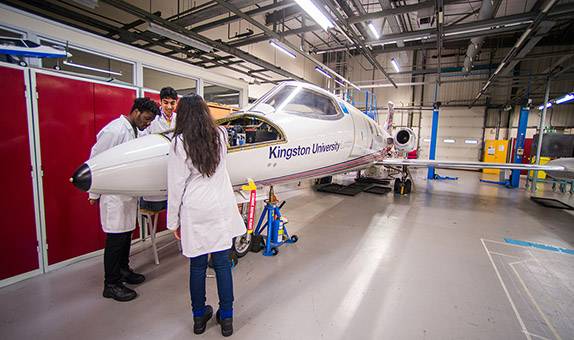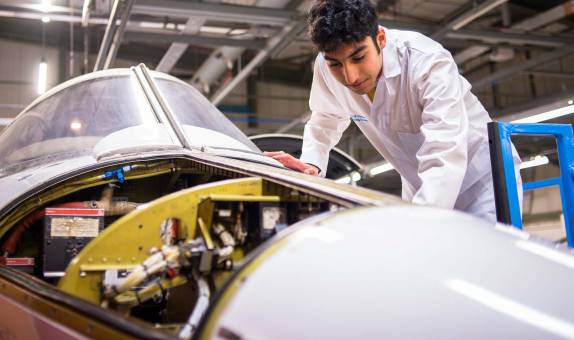Applied Aircraft Engineering foundation degree
Why choose this course?
Through this course you will develop the leadership tools, skills and qualifications required to enable aircraft maintenance engineers to progress into leadership and management positions. You'll build your professional network by studying alongside students working in different organisations with varying backgrounds and managerial experience. Successful completion of this programme will enable you to apply to the BSc (Hons) Aircraft Engineering top-up programme.
This course is offered part-time and online, and leads to the award of a Foundation Degree. The course will start with an onsite induction session at Kingston University. For those students that are unable to attend, an induction resources in Canvas/MS Teams will be available followed by an on-going online support.
| Attendance | UCAS code | Year of entry |
|---|---|---|
| 2 years part time | 20242025 |
| Main location | Online |
Reasons to choose Kingston University
- You can balance your studies with your career through part-time online learning.
- You will be taught by expert staff who continue to practise and research at the cutting edge of their discipline.
- There is the option to progress to an honours degree on successful completion of the course.
What you will study
You will study three taught modules (90 credits), usually taken over two years.
150 credits will be awarded through Recognition of Prior Learning.
Modules
Modules
Applied Engineering Analysis and Communication
30 credits
The module will ensure that you have a range of skills to enable you to apply and communicate the knowledge acquired in the European Aviation Safety Agency (EASA) modules and to extend that knowledge as required.
The module covers four main themes: mathematics, engineering problem solving, communication skills and research methods. It also provides a foundation for further study at higher levels.
Professional Development
30 credits
This module will enable you to develop self-reflective skills and reflect on your progress throughout your professional career to date. You will assemble a portfolio of evidence of the key and practical skills you have acquired in their normal job role. The portfolio will then be used to support the creation of a Development Plan for the next 2 to 3 years.
Aircraft Engineering Leadership
30 credits
This module will develop leadership and management skills, introducing a broad range of skills for effectively managing others. It will consider the basic principles of project management and accounting, and develop the ability to analyse and describe the external environment facing managers. The module will introduce the principles of leadership and team development and the management of people and teams and the topic of Corporate and Social Responsibility/ESG which will include ethics and sustainability.
Aims of this module:
- introduce a broad range of skills which are necessary to move from being managed themselves to managing others.
- evaluate the economic environment and the key influences on that environment to understand the context of business decisions
- develop the leadership and team management skills to manage themselves and others.
Future Skills
Knowledge to give you the edge
Embedded within every course curriculum and throughout the whole Kingston experience, Future Skills will play a role in shaping you to become a future-proof graduate, providing you with the skills most valued by employers such as problem-solving, digital competency, and adaptability.
As you progress through your degree, you'll learn to navigate, explore and apply these graduate skills, learning to demonstrate and articulate to employers how future skills give you the edge.
At Kingston University, we're not just keeping up with change, we're creating it.

Entry requirements
Teaching and assessment
You will study online through synchronous interactive video (e.g. through Microsoft Teams), teacher guided and supported asynchronous learning and teaching, and independent study.
Who teaches this course?
The course is taught by the Department of Aerospace and Aircraft Engineering. Staff have a wide range of experience across research and industry and continue to practice and research at the cutting edge of their discipline. This ensures that our courses are current and industry informed ensuring you get the most relevant and up-to-date education possible.
Course fees and funding
Additional costs
Depending on the programme of study, there may be extra costs that are not covered by tuition fees which students will need to consider when planning their studies. Tuition fees cover the cost of your teaching, assessment and operating University facilities such as the library, access to shared IT equipment and other support services. Accommodation and living costs are not included in our fees.
Where a course has additional expenses, we make every effort to highlight them. These may include optional field trips, materials (e.g. art, design, engineering), security checks such as DBS, uniforms, specialist clothing or professional memberships.
After you graduate
Successful completion of this programme enables you to progress to the final year of the BSc (Hons) Aircraft Engineering top-up programme. Kingston graduates work at British Airways, Virgin Atlantic, KLM UK Engineering, DHL, the Royal Navy, the British Army and BAES.
Course changes and regulations
The information on this page reflects the currently intended course structure and module details. To improve your student experience and the quality of your degree, we may review and change the material information of this course. Course changes explained.
Programme Specifications for the course are published ahead of each academic year.
Regulations governing this course can be found on our website.

